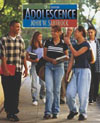John W. Santrock,
University of Texas, Dallas
| affectionate love | Also called companionate love, this love occurs when an individual wants to have another person near and has a deep, caring affection for that person.
|
 |
 |
 |
| anticonformity | This occurs when individuals react counter to a group's expectations and deliberately move away from the actions or beliefs the group advocates.
|
 |
 |
 |
| cliques | These units are smaller, involve more intimacy, and are more cohesive than crowds. They are, however, larger and involve less intimacy than friendships.
|
 |
 |
 |
| conformity | This occurs when individuals adopt the attitudes or behaviors of others because of real or imagined pressure from them.
|
 |
 |
 |
| conglomerate strategies | Involves the use of a combination of techniques, rather than a single approach, to improve adolescents' social skills.
|
 |
 |
 |
| controversial children | Children who are frequently nominated both as being a best friend and as being disliked.
|
 |
 |
 |
| crowd | The largest, most loosely defined, and least personal unit of adolescent peer society. Crowds often meet because of their mutual interest in an activity.
|
 |
 |
 |
| dating scripts | The cognitive models that adolescents and adults use to guide and evaluate dating interactions.
|
 |
 |
 |
| intimacy in friendship | In most research, this is defined narrowly as self-disclosure or sharing of private thoughts.
|
 |
 |
 |
| neglected children | Children who are infrequently nominated as a best friend but are not disliked by their peers.
|
 |
 |
 |
| nonconformity | This occurs when individuals know what people around them expect but do not use these expectations to guide their behavior.
|
 |
 |
 |
| norms | Rules that apply to all members of a group.
|
 |
 |
 |
| peers | Children or adolescents who are of about the same age or maturity level.
|
 |
 |
 |
| popular children | Children who are frequently nominated as a best friend and are rarely disliked by their peers.
|
 |
 |
 |
| rejected children | Children who are infrequently nominated as a best friend and are actively disliked by their peers.
|
 |
 |
 |
| roles | Certain positions in a group that are governed by rules and expectations. Roles define how adolescents should behave in those positions.
|
 |
 |
 |
| romantic love | Also called passionate love or Eros, this love has strong sexual and infatuation components, and it often predominates in the early part of a love relationship.
|



 2003 McGraw-Hill Higher Education
2003 McGraw-Hill Higher Education

 2003 McGraw-Hill Higher Education
2003 McGraw-Hill Higher Education